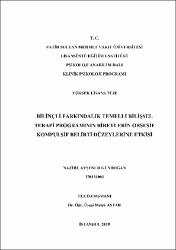Bilinçli Farkındalık Temelli Bilişsel Terapi Programının Bireylerin Obsesif Kompulsif Belirti Düzeylerine Etkisi
Citation
GÜNDOĞAN, Nazire Ayşenur, Bilinçli Farkındalık Temelli Bilişsel Terapi Programının Bireylerin Obsesif Kompulsif Belirti Düzeylerine Etkisi, Fatih Sultan Mehmet Vakıf Üniversitesi Lisansüstü Eğitim Enstitüsü Psikoloji Anabilim Dalı, Yayımlanmamış Yüksek Lisans Tezi, 2019.Abstract
Bu çalışma, bilinçli farkındalık temelli hazırlanan bilişsel terapi programının
bireylerin obsesif kompulsif belirti düzeyleri üzerine etkisini incelemek amacıyla
hazırlanmıştır. Araştırmada kontrol gruplu ön test- son test- izlem testi modeli ve
deneysel yöntem kullanılmıştır. Araştırmanın örneklemini İstanbul ilinde ikamet
eden 17-65 yaş arası katılımcılardan, çalışma için belirlenen kriterlere en uygun
olanlar oluşturmaktadır. Araştırmada veri toplama araçları olarak kişisel bilgilerin
edinebilmek amacıyla “Demografik Bilgi Formu”, katılımcı kriterlerini incelemek
amacıyla “SCL-90 Belirti Tarama Listesi” ve deneyimlenen obsesif kompulsif belirti
düzeyini belirleyebilmek amacıyla “Padua Envanteri” kullanılmıştır. Veri toplama
araçları kontrol ve müdahale gruplarına uygulama başlamadan önce ön test,
uygulama tamamlandıktan sonra son test, izlem süreci tamamlandıktan sonra ise
izlem testi olarak uygulanmıştır. Müdahale grubuna 150’şer dakika süren toplamda
sekiz oturumluk program uygulanırken, kontrol grubuna bu süre zarfında herhangi
bir uygulama yapılmamıştır. Müdahale programı tamamlandıktan sonra her iki grup
için izlem süreci başlatılmıştır. Belirlenen süre tamamlanıldığında Padua Envanteri
katılımcılara izlem testi olarak tekrar uygulanmıştır. Elde edilen verilerin analizinde
SPSS 20.0 yardımıyla Bağımsız Örnek t Testi, Tek Örnek Ki Kare Analizi ve
Tekrarlı ölçümler için İki Yönlü Varyans Analizi (ANOVA) kullanılmıştır.
Yapılan analiz sonucunda, müdahale grubuna uygulanan programın
sonucunda katılımcıların Padua Envanteri’nde ifade ettikleri obsesif kompulsif belirti
düzeylerinde istatistiksel olarak anlamlı bir düşüş görülmüştür. İzlem testi analizine
göre düşen belirti düzeyleri dört ay sonrasına kadar aynı aralıkta devam etmiştir.
Kontrol grubu için yapılan analizde ön test, son test ve izlem testi puanlarında
anlamlı bir farklılık görülmemiştir. Çalışmanın sonucuna göre, Bilinçli Farkındalık
Temelli Bilişsel Terapi Programı, obsesif kompulsif bozukluğun tedavisinde
destekleyici bir müdahale olarak değerlendirilebilir olduğu düşünülmektedir. This study was aimed to examine the effects of mindfulness based cognitive
therapy on obsessive compulsive symptoms. The research is an experimental study
that is based on including an experiment group and a control group; pre-test, post-test
and fallow up model is used. Sample of this study is composed of individuals
between 17-65 in Istanbul who were most suitable to this study’s required criteria. In
this research, “Personal Information Questionnaire” is used to collect basic
information from participants and “SCL-90 Symptom Checklist” is used for
participant criteria. In order to measure the level of obssessive compulsive
sympotms, “Padua Inventory” is used. Measurement tools were used before the
implementation process as pre-test, after the process as post-test and after finishing
the fallow up process, applied as fallow up test.Intervention group include eight
sessions and each session were 150 minutes. While control group does not include
any intervention. After the program, fallow up process started for both of the groups.
Upon completion of the fallow up process, Padua Inventory was applied as fallow up
test to both of the groups. Collected data analyzed with SPSS 20.0. Independent t
Test, One Sample Chi Square Analysis and Two way repeated measure ANOVA
were applied to calculate repetitive measurement.
Results have shown that, after the program of the intervention group, there
was a statistically significant decrease in individuals’ obsessive compulsive symptom
levels according to their Padua Inventory answers. Fallow up test scores of
intervention group maintain the decreased level of symptoms throughout four
months. Any statistically significant difference was not found between control
group’s pre-test, post-test and fallow up scores. Regard to this research’s results,
mindfulness based cognitive therapy can be used as a supportive intervention for the
treatment of obsessive compulsive disorder.



















